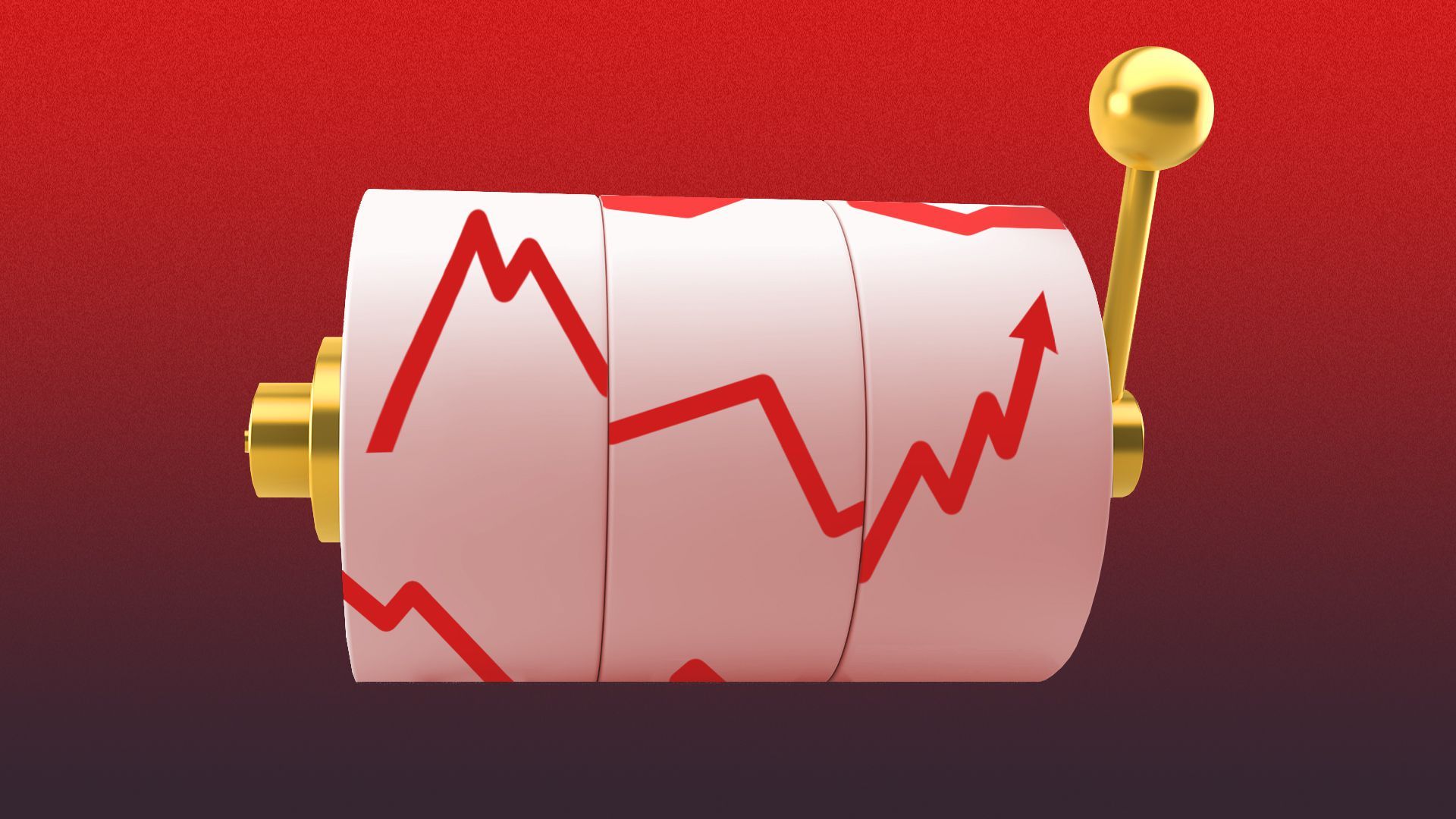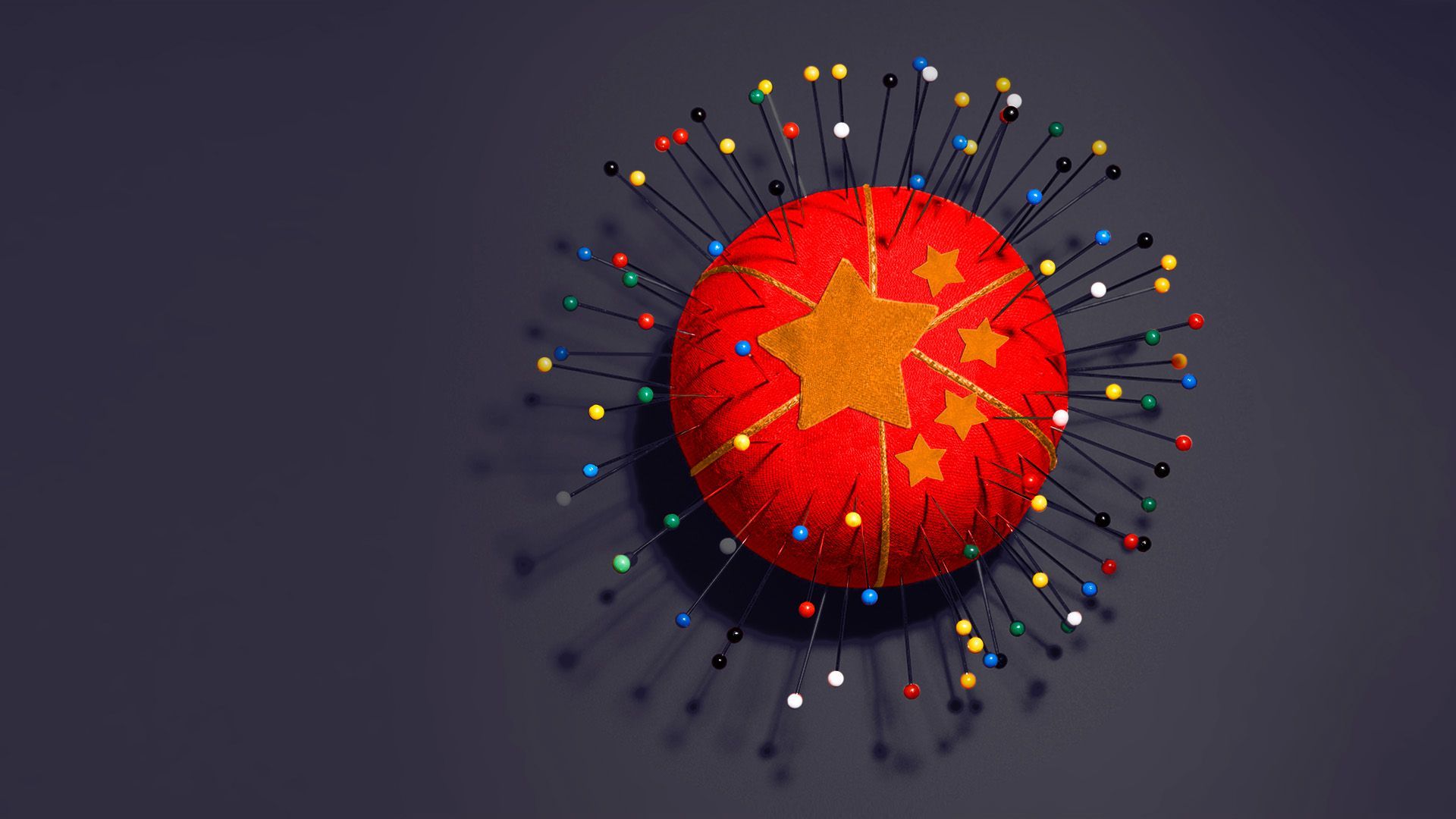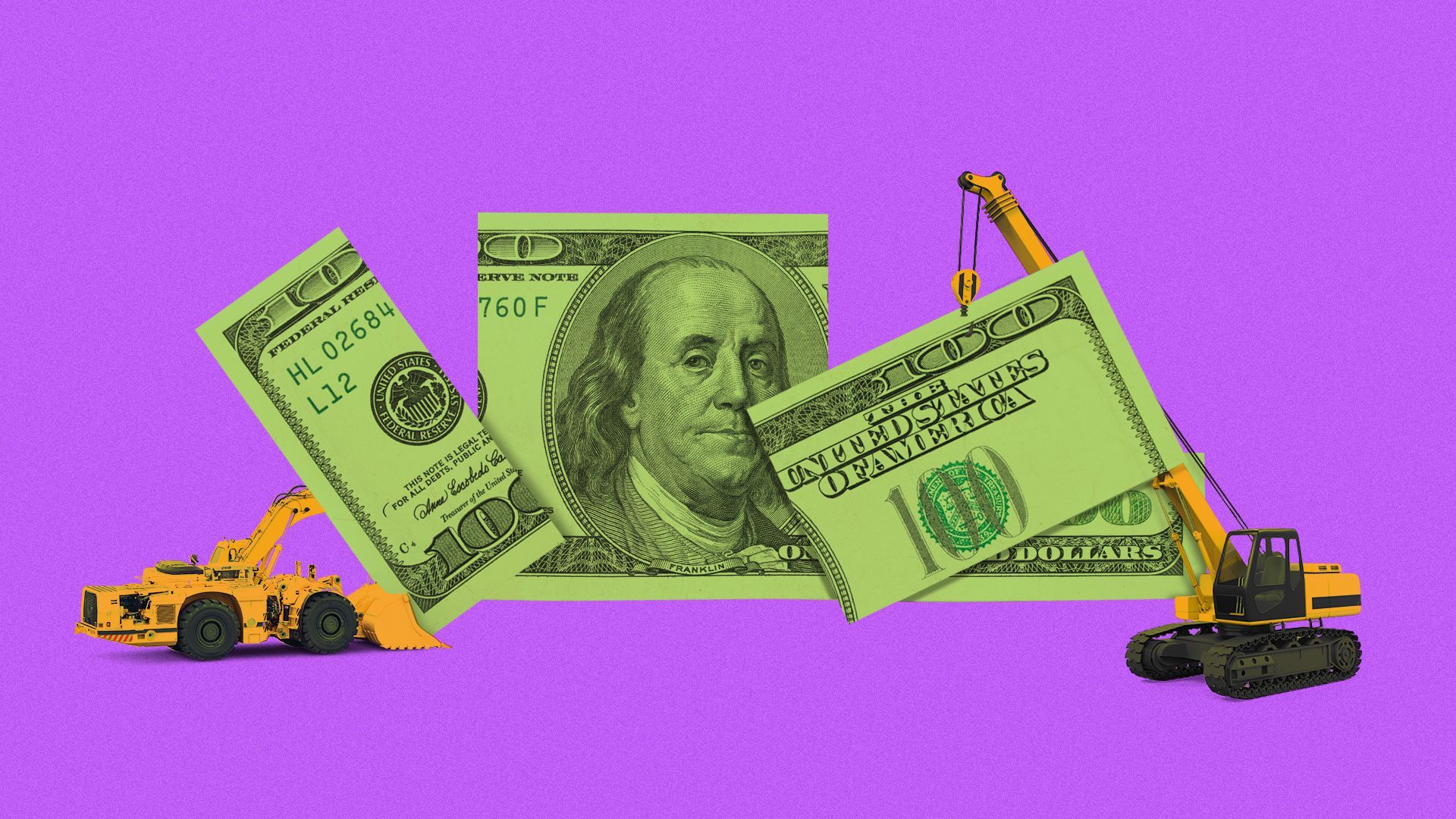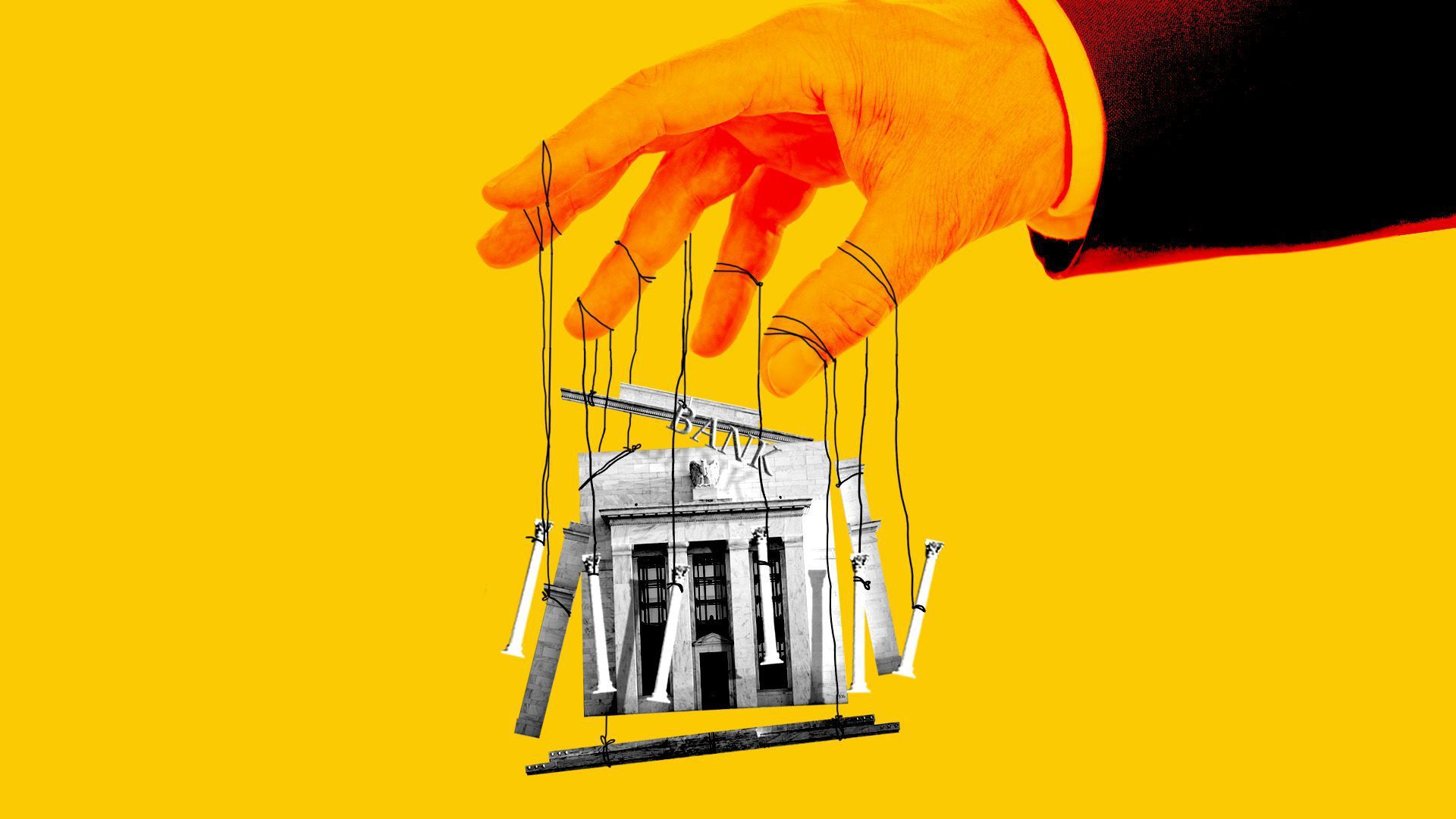Axios Capital

September 10, 2020
Welcome back to Axios Capital, which is a free newsletter and not a hedge fund. I hope you like the redesign; if you’re not a subscriber yet, you can do so here.
Situational awareness: Jane Fraser is set to become the first female CEO of a big U.S. bank, when she takes over from Citi's Mike Corbat in February.
Many thanks to Axios' Bethany Allen-Ebrahimian for helping out with my item No. 3 this week. She'll be joining our colleague Dave Lawler tomorrow at 12:30pm ET for a live, virtual event on U.S. foreign policy in the post-pandemic world, featuring Carnegie Endowment experts William Burns, Evan Feigenbaum, and Maha Yahya.
- Register here.
In this week's newsletter: Postmodern market capitalism; Netflix agonistes; apparel in China; Main Street lending (or the lack thereof); Argentine debt restructuring; bland brands; and much more. All in 1,735 words, a 7-minute read.
1 big thing: Decadent stonks
Illustration: Annelise Capossela/Axios
There have been moments of market euphoria in the past, moments when stocks stop being a serious mechanism for the allocation of scarce capital, and start being a fun, positive-sum casino.
There have also been moments of national crisis, with tens of millions on the unemployment rolls and an implacable enemy killing hundreds of thousands of innocent Americans.
- Never before have we seen both at the same time.
Driving the news: For people who like to look at daily movements in the stock market, the past week has been thrilling. Stocks went down quite a lot, led by tech stocks in general and Tesla in particular, and then yesterday that story was reversed.
- Between the lines: While almost $2 trillion was wiped off the value of Nasdaq stocks alone, they nearly all remained above their pre-pandemic highs, which gave the whole episode a feeling of unreality.
- Traders are effectively playing with the house's money — except when they take profits to buy a house, or maybe a $3.9 million baseball card.
Between the lines: While day-traders were making $1.5 million mistakes trading Kodak stock, Japanese tech giant Softbank was buying not only $4 billion in public stocks but also options with a notional value of about $50 billion more. That trade was worth more than $4 billion before the market downturn, and could have been big enough to move the market on its own.
- The other side: Tesla took advantage of the frothy market to sell a whopping $5 billion of stock between Sept. 1 and Sept. 4. That's real money — more than 20 times as much as it raised in its IPO in 2010.
By the numbers: Retail investors now account for 19.5% of all stock trading, according to market-structure guru Larry Tabb. That's up from 14.9% last year.
- Financial products are being revamped to become more retail-friendly. Tesla, for instance, split its stock price to seem more affordable, while the CME options exchange has introduced "micro mini" options to make the market more tradable when the mini options were still too expensive.
The big picture: While retail investors betting a few thousand dollars might be small fry by Wall Street standards, they're still relatively big fish in a country where the median annual income is $40,000 per year, and where an income of $70,000 puts you in the top quartile.
What they're saying: Japanese billionaire Yusaku Maezawa lost more than most on his day-trading activity — and understands that it wasn't play money. "With ¥4.4 billion [$41 million], how many people could the money have been given out to and saved?" he tweeted. "There's no end to this regret."
R.I.P.: Financial anthropologist David Graeber died on Wednesday. "In this final, stultifying stage of capitalism, we are moving from poetic technologies to bureaucratic technologies," he wrote in 2012, urging society to "break free of the dead hand of the hedge fund managers."
- The irony is that the stock market itself has now become a poetic technology. The hedge fund managers may be less important than ever, but market capitalism retains its iron grip on society.
2. The secret of Netflix's success


Netflix co-founder Reed Hastings is on a publicity tour for his how-to management book, in which he attempts to teach other CEOs how to manage the Netflix way.
- Between the lines: Hastings' real superpower as a manager — one that he never really admits to in the book — is that, thanks to the gravity-defying Netflix share price, he isn't cash constrained. In fact, the more cash he burns, the more valuable his company becomes.
- Netflix staffers are all paid "top of personal range," which means base salaries as high as $20 million per year. Meanwhile, Hollywood producers like Shonda Rhimes and Ryan Murphy can effectively name their price.
By the numbers: In just five years — from 2015 to 2019 — Netflix had more than $10 billion of negative free cash flow. That's just the cash going out the door; it doesn't include many billions more in promised future payments.
- Cash flow improved this year, just because production halted on so many productions after the pandemic hit. But expect it to go sharply negative again as soon as filming restarts in earnest.
Context: Hastings is similar to Bridgewater CEO Ray Dalio, another proponent of radical honesty and the salutary effects of receiving a constant barrage of negative feedback. This week, while on book tour, Hastings still found time to fire a senior executive.
- The latest victim was Cindy Holland, the powerful head of original content, responsible for such hits as "House of Cards," "Orange Is the New Black," "Stranger Things," and "The Crown."
- Such firings are not unusual: Hastings previously fired his chief communications officer, his chief marketing officer, his chief product officer, his chief financial officer, his chief talent officer, and many, many more. He even fired Netflix's original CEO, Marc Randolph, via PowerPoint presentation.
- Multiple former colleagues described Hastings to the Wall Street Journal as being “unencumbered by emotion.”
The big picture: Columbia Business School professor Jonathan Knee reviewed Hastings' book for the New York Times, noting that "the problem of encouraging innovation in high performing work environments of the creative economy" is pretty low down anybody's list of priorities in this age of existential cultural crises.
- Hastings seems to go out of his way to avoid larger cultural issues, telling the Financial Times that "it is not smart to dabble" in news programming. He recently cancelled "Patriot Act with Hasan Minhaj," a current affairs show that won Emmy and Peabody awards.
3. The promise and peril of China
Illustration: Annelise Capossela/Axios
The fashion industry is reeling from the stunning blow dealt by a global pandemic that closed stores, largely ended international travel, and caused consumer demand for its products to shrivel.
- Now it needs to worry about a major supply chain disappearing, too.
As I wrote on Sunday, all paths to recovery in fashion lead through China — the country with the most dedicated fashionistas and also the industry's highest-skilled artisans.
- Altagamma, the fashion industry association, expects Chinese consumers to account for 50% of the global luxury market as soon as 2025.
The other side: Chinese geopolitics could cause a major headache for the global apparel industry.
Driving the news: As of Sept. 30, U.S. companies will not be allowed to do any business, directly, or indirectly, with major cotton producer Xinjiang Production and Construction Corps (XPCC).
- "The XPCC is one of the biggest organizations to have ever been sanctioned by OFAC," says James Treanor, legal counsel at Cadwalader with expertise in sanctions.
Context: The XPCC is among the most powerful organizations in China's northwest region, writes Axios' Bethany Allen-Ebrahimian, and dominates China's cotton industry.
- It's a paramilitary colonizing force first sent to the region in the 1950s, when China wanted to solidify its control over what it viewed as a restive frontier region.
- The XPCC also helps operate some of the mass internment camps that China has built around the region since early 2017, when Chinese authorities began detaining a million or more ethnic minorities in an attempt to forcibly assimilate them.
Why it matters: The XPCC sanction could become a virtual ban on China's entire garment industry, on which the U.S. retail industry is largely dependent.
The bottom line: No industry is ever safe from a trade war.
4. The dampest of squibs


Leverage is incredibly powerful, in theory: It can turn $75 billion in to $600 billion.
- In practice, however, if no one makes use of the leverage, that $75 billion can become just $1 billion.
Flashback: In early April, the Federal Reserve announced that it would lend up to $600 billion to "Main Street" businesses — companies with fewer than 15,000 employees or revenues less than $5 billion.
- The program was backstopped by $75 billion from the CARES Act.
By the numbers: The program has by any standards been an abject failure. A spreadsheet listing all of the loans is a mere 118 rows long, and only 25 states have any companies at all that received funding.
- Total loans issued to date: $1.1 billion.
- Florida has the most loans by value ($261 million) and by number (50).
- The big four Main Street banks — Chase, Citi, BofA, Wells Fargo — account for zero loans among them.
- The Nonprofit Organization Expanded Loan Facility, which is part of the Main Street program, had a very late start and has also made no loans at all.
The big picture: The program is complex, and requires much more underwriting than the PPP loans. (These loans aren't forgivable, and banks need to retain 5% on their own balance sheet.) But it would clearly have been much more effective to have just given the $75 billion away, rather than trying to lever it up via a Federal Reserve loan program.
5. Argentina's restructuring triumph
Illustration: Aïda Amer/Axios
Argentina's debt restructuring is finished, and, for anybody who remembers Argentina's last debt default, this one was gloriously smooth.
By the numbers: Argentina restructured $69 billion in foreign bonds, plus another $42 billion in foreign currency local law bonds. The country negotiated a reduction in its effective interest rate from 7% to 3%, which translates to a creditor "haircut" of about 45 cents on the dollar in present-value terms.
- Most impressively, the first exchange offer was presented to bondholders on April 21; the deal was done by early September. That's a far cry from the decade-long litigation that we saw last time around.
How it works: Argentina managed to get 99% participation on both the local-law and foreign-law exchanges. In order to get there, it used collective action clauses, or CACs: if enough bondholders of a certain bond voted to restructure, then all of them would be bound into the deal.
- That's how 99% of the bonds ended up being exchanged, even though only 93.5% of them voted in favor of the deal.
- It's a prime example of CACs working exactly as they were designed to work.
The bottom line: Argentina is a serial defaulter. Maybe practice makes perfect.
6. What we're reading: The triumph of the bland
Illustration: Sarah Grillo/Axios
The next time you see an ad for some well-packaged product on Instagram, ask yourself:
- Is this brand affable — but not overbearing? Upbeat — but not unrealistic? Casual — but not careless? Pure — but not pious? Cheeky — but not annoying? Sincere — but not earnest?
If so, you have probably encountered what Ben Schott has dubbed a "bland" — an "ironic normcore trifle" for the rich, or "fleeting facsimile of prosperity" for the middle class.
- Read his whole essay, it's fantastic.
7. Coming up: A big Fed meeting
Illustration: Sarah Grillo/Axios
Jay Powell isn't going to raise interest rates at the end of the two-day meeting that ends on Wednesday. But he is going to release the Fed's official summary of economic projections, and he's also going to give his first press conference since the radical change he made in interpreting the Fed's mandate.
8. Building of the week: The Farnsworth House
Photo: Carol M. Highsmith/Buyenlarge/Getty Images
Ludwig Mies van der Rohe completed the Farnsworth House, in Plano, Illinois, in 1951.
- Now a museum, the 1,500 square foot single-room house was commissioned by Edith Farnsworth, a Chicago doctor, as a modernist rural retreat. She wanted — and Mies delivered — a vision of simplified, transcendental existence.
- Writes historian Maritz Vandenburg: "Every physical element has been distilled to its irreducible essence. The interior is unprecedentedly transparent to the surrounding site, and also unprecedentedly uncluttered in itself."
Sign up for Axios Capital

Learn about all the ways that money drives the world





